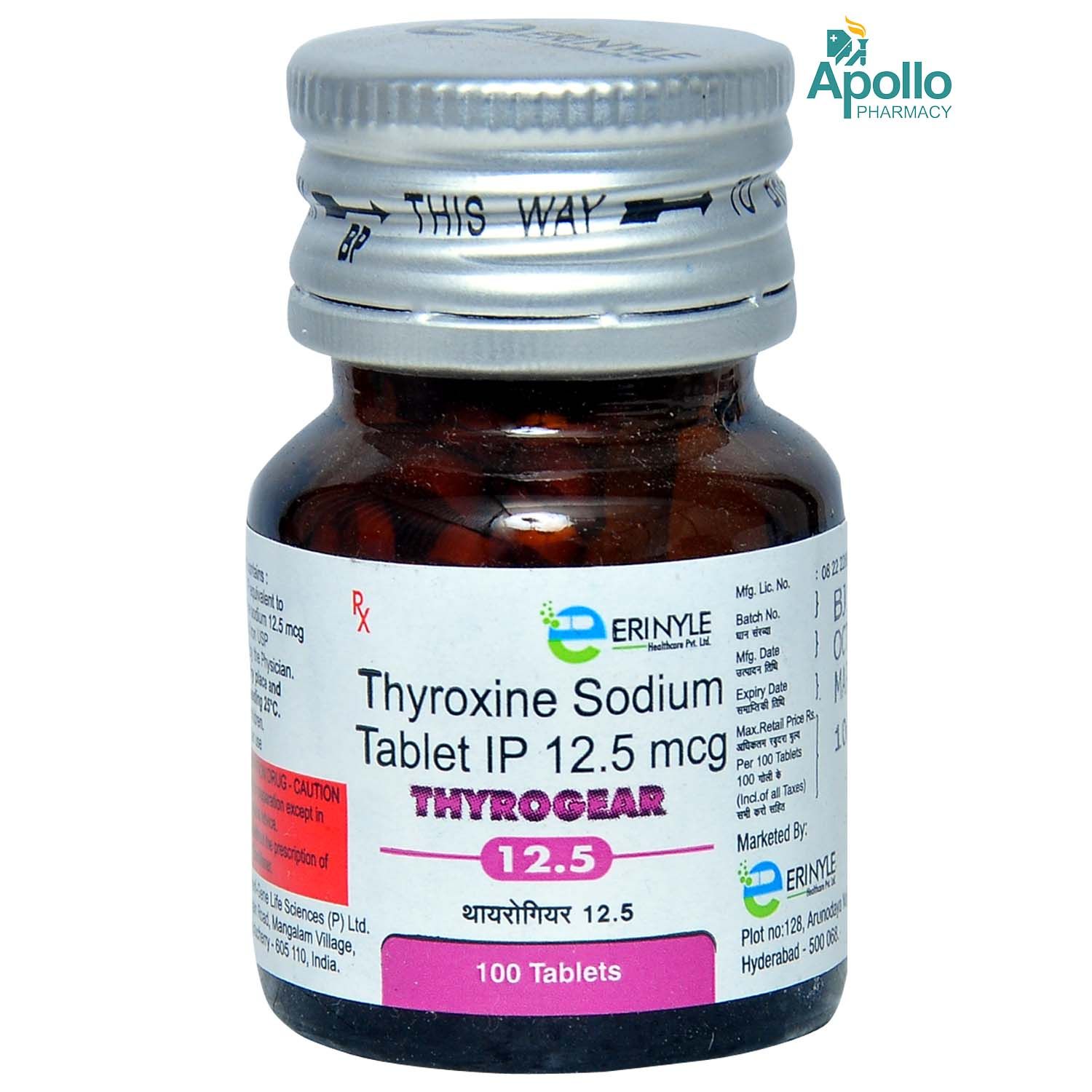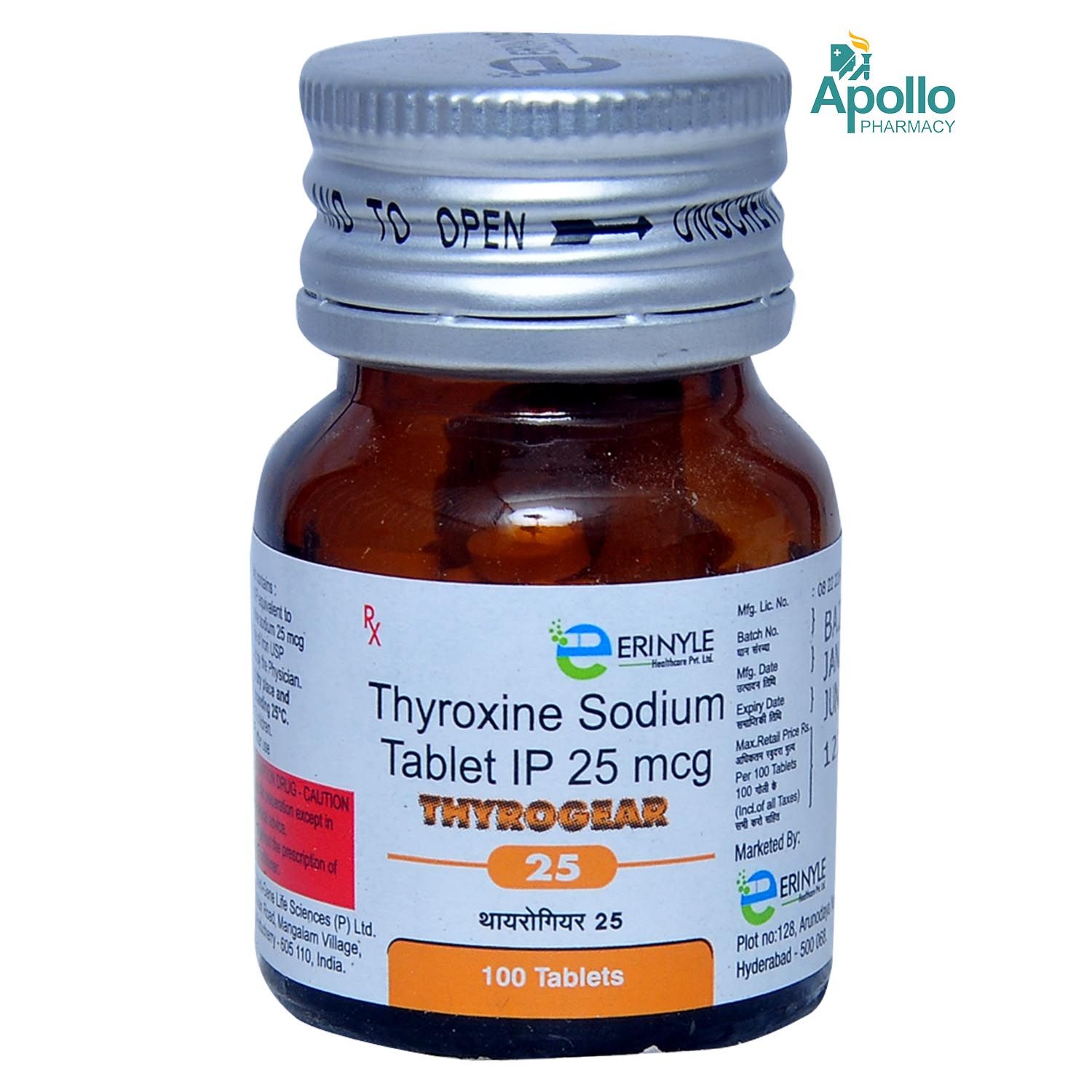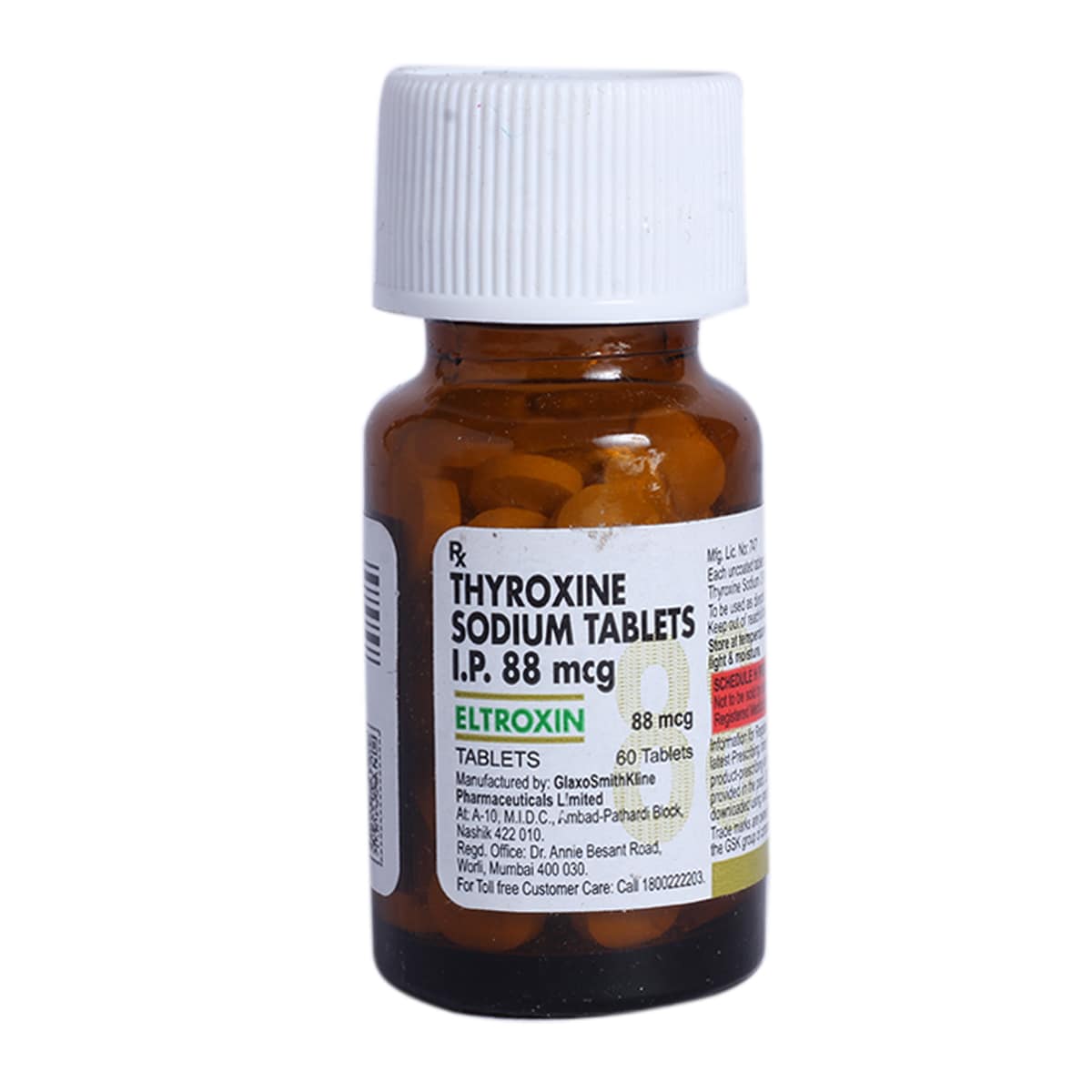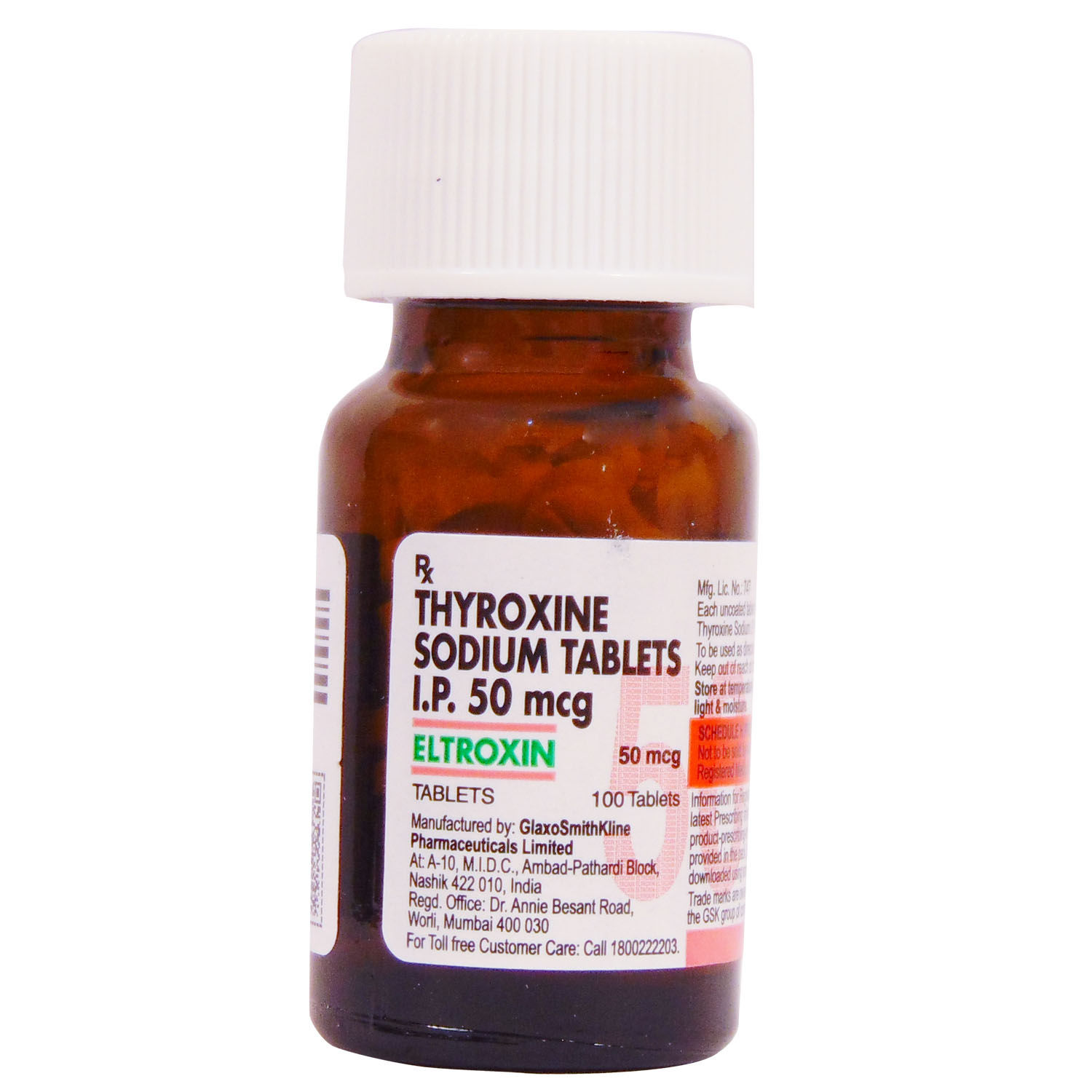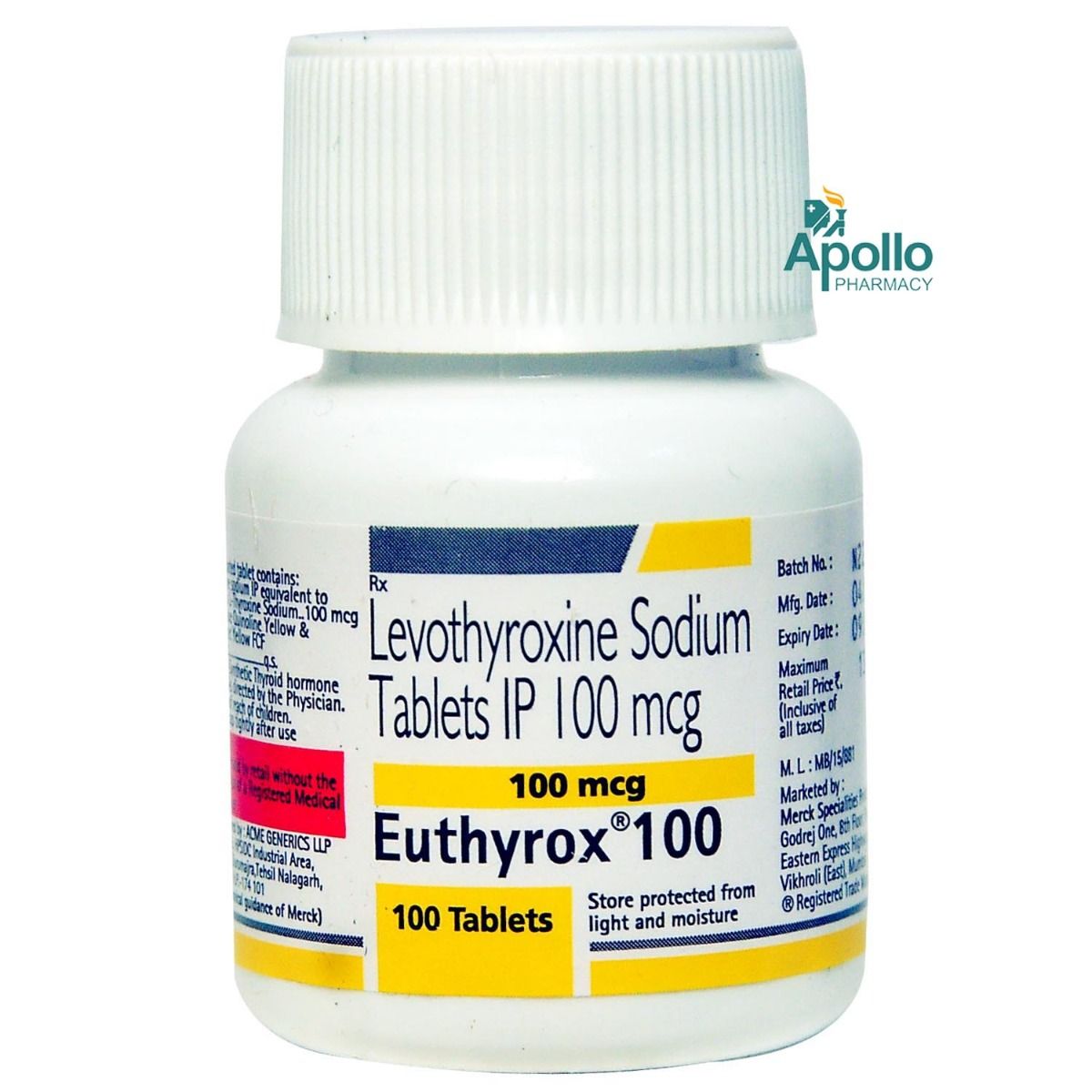Thyroxine
About Thyroxine
Thyroxine is a synthetic thyroid hormone that works by replacing the thyroid hormone in the body when the natural production of thyroid hormones is not sufficient to meet the needs of the body. Thyroxine is primarily taken for treatment of hypothyroidism or low secretion of thyroid hormone. It comprises thyroxine which is a synthetic thyroid hormone that is chemically similar to thyroxine produced by our thyroid gland. Thyroxine helps to replace missing thyroid hormone and/or to relieve stress on the thyroid gland.
Hypothyroidism is a chronic condition in which our thyroid gland (located below the throat in the neck) is not able to produce enough thyroid hormone. Thyroid hormones are composed of tri-iodothyronine (T3) and thyroxine (T4) which controls the body's metabolism. In the condition of underactive thyroid body’s metabolism slows down and the person feels less energetic. Other symptoms include easy fatiguability, constipation, weight gain, feeling cold even in warm weathers, dry skin or too much or too fewer menses (in women) or even low mood. Treatment of hypothyroid is essential to restore the normal body metabolism (basal metabolic rate).
If you are experiencing any of the above symptoms, your doctor will advise you to undertake a blood test called 'thyroid function test' which checks three hormones related to thyroid - TSH, T3, T4. High TSH and low T3/T4 indicates that your thyroid gland is not functioning normally. The dose of Thyroxine is adjusted by your doctor on the basis of your body weight and thyroid function test report. It may take some weeks for the medicine to fully show its effects. Regular monitoring of thyroid function is advised to ensure that you receive the optimum dose of Thyroxine.
Take Thyroxine as prescribed by your doctor. Thyroxine usually does not have major side effects when taken regularly in the prescribed dosage but, overdosage may cause headache, nervousness, sleeplessness, irritability, diarrhoea, muscle spasm, weight loss, feeling hot even in cool environments, menstrual irregularities (in women), and skin rash. If you missed a dose do not take a double dose as it may produce serious side effects.
Your doctor may prescribe calcium or vitamin D supplements alongside Thyroxine for your bone health. Thyroxine should not be used for the purpose of weight loss alone. People affected with diabetes taking Thyroxine may have altered blood glucose control that may result in increased antidiabetic agents or insulin requirements. Hence, it is recommended that people with diabetes should contact a doctor and carefully monitor their glucose level after starting, changing, or discontinuing thyroid hormone therapy.
Uses of Thyroxine
Medicinal Benefits
Thyroxine controls an underactive thyroid gland (hypothyroidism) and minimizes symptoms of low thyroid hormones like unknown weight gain, fatigue, sensitivity to the cold and many more. Thus, it helps in replacing the body's own natural thyroid hormone essential for maintaining both mental and physical health. However, Thyroxine should not be used for the treatment of weight loss or obesity.
Directions for Use
Storage
Side Effects of Thyroxine
Irregular heartbeat (palpitations)
- Muscle spasm
- Headache
- Nervousness
- Irritability
- Sleeplessness
- Tremors
- Muscle weakness
- Increased appetite
- Weight loss
- Diarrhoea
- Heat intolerance
- Menstrual irregularities
- Skin rash
Drug Warnings
Foods like soybean flour, cottonseed meal, cabbage, cauliflower, walnuts, dietary fibre, calcium, and calcium-fortified juices may affect the working of Thyroxine. Hence, avoid the intake of these foods within several hours of dosing if possible. Thyroxine should not be administered to patients with acute myocardial infarction and high blood pressure patients. Close clinical monitoring of heart function is recommended before taking Thyroxine. Long term use of Thyroxine may affect your bone health leading to osteoporosis increasing the risk of bone fractures. Hence, your doctor may prescribe calcium or vitamin D supplements alongside Thyroxine for your bone health. Thyroxine should not be used for the purpose of weight loss alone. People affected with diabetes taking Thyroxine may have altered blood glucose control that may result in increased antidiabetic agents or insulin requirements. Thyroxine should is not recommended for the treatment of thyroid cancer and weight reduction.
Drug Interactions
Drug-Drug Interactions: Medicines like appetite suppressant (phentermine), acidity medicine (esomeprazole), anti-diabetic drug (metformin), calcium/vitamin D, and neuro-related medicine (amphetamine/dextroamphetamine), interact with Thyroxine. So, if you are taking these medicines make sure you contact your doctor before taking Thyroxine.
Drug-Food Interactions: If you are taking any homoeopathic, ayurvedic, Unani or any OTC items let your doctor know about this. These medicines may interact with Thyroxine and affect its working. Besides this, absorption of Thyroxine may be decreased by foods like soybean flour, cottonseed meal, walnuts, dietary fibre, calcium, and calcium-fortified juices. So, try to avoid these foods if possible.
Drug-Disease Interactions: Thyroid hormones increase the workload of the heart and oxygen consumption of the body. Hence, a Thyroxine should be taken with caution in the heart patients (cardiovascular disorders) like high blood pressure, chest pain (angina), and coronary artery disease. You should have regular monitoring of heart function. If chest pain occurs frequently contact the doctor so that doctor may reduce the dosage.
Drug-Drug Interactions Checker List:
Safety Advice

Alcohol
cautionYou are recommended not to consume alcohol along with Thyroxine to avoid unpleasant side effects.

Pregnancy
safe if prescribedOnly consume Thyroxine, if you are prescribed by a doctor. However, the need for Thyroxine may increase during pregnancy due to increased blood levels of oestrogen (female sex hormone) hence, monitoring of thyroid function should be done regularly both during and after pregnancy. In this case, the thyroid hormone dose can be adjusted by your doctor.

Breast Feeding
cautionEven during high-dose thyroxine therapy, the amount of Thyroxine passing into the breast milk during lactation is very low and therefore harmless. However, if you have any doubt consult a doctor.

Driving
safe if prescribedThyroxine does not interfere with your ability to drive.

Liver
safe if prescribedThyroxine does not have any reported interaction hence, in case you experience any difficulty discuss with your doctor.

Kidney
safe if prescribedThyroxine can be taken in the prescribed dose as it does not affects the kidney. However patient with adrenal gland complication or problem should consult a doctor before its intake.

Children
safe if prescribedThyroxine can be given to the children (new-borns and infants) with inborn thyroid hormone deficiency. To achieve normal mental and physical development, the initial recommended dosage is 10-15 mcg per kg/day for the first 3 months. After that doctor would adjust the dose individually according to the thyroid hormone level and TSH values measured in blood.
Habit Forming
Diet & Lifestyle Advise
Eating the right nutrients and taking a regular dose of your prescribed medications may help reduce your symptoms and improve your thyroid function. Iodine, zinc, and selenium are beneficial for people with hypothyroidism. However, it’s best to avoid iodine and selenium supplements unless your doctor advises you to take them.
In hypothyroidism usually, there is a loss of calcium (hypocalcemia) and Vitamin D in our body. In such a case, people affected with hypothyroidism should opt for calcium-enriched foods.
People with hypothyroidism usually have a slower metabolism and eating more protein may help boost your metabolism.
Daily yoga and aerobics exercises can help in boosting metabolism.
People with hypothyroidism should prefer the intake of more vegetables, fruits, and lean meats. These foods are low in calories and may help prevent weight gain.
Avoid taking Goitrogens (agents which interfere with the normal function of the thyroid gland) which generally includes soy foods (tofu), cabbage, broccoli, kale, cauliflower, spinach, sweet potatoes, cassava, peaches, strawberries, millet, pine nuts, peanuts, etc.
Special Advise
Doses beyond the range of may produce serious or even life-threatening manifestations of toxicity. Thus, if you forget to take Thyroxine anytime, take the medicine as soon as you remember to take it. However, if it is almost time for your next dose, you make avoid the skipped dose and continue with your regular regime as advised by your doctor.
Thyroxine should not be used for the treatment of obesity or for weight loss.
Patients with adrenaline or pituitary gland problem, heart diseases, diabetes, clotting disorders should not take Thyroxine without consulting a doctor as the dose may need to be adjusted.
Diabetes patients taking Thyroxine should contact the doctor before starting this medicine as it may worsen glycaemic control and may result in increased antidiabetic pills or insulin therapy.
Regular intake of Thyroxine may decrease bone mineral density, particularly in post-menopausal women. Hence, consult your doctor who might prescribe you the lowest dose possible for your bone health.
If you are taking Thyroxine prior to any surgery let your doctor know about this.
Thyroid function tests are usually done on an empty stomach after overnight (6-8 hrs) fasting.
Patients Concern
Disease/Condition Glossary
Hypothyroidism, or underactive thyroid, is a chronic condition when the thyroid gland does not make enough thyroid hormones to meet your body’s needs. When there is a low level of thyroid hormones, our body’s functions and metabolism slow down. Symptoms of hypothyroidism include tiredness, increased sensitivity to cold, constipation, dry skin, unexplained weight gain, puffy face, hoarseness of voice, and muscle weakness. There may be a loss of Calcium and Vitamin D in some cases of hypothyroidism.
FAQs
Thyroxine is used for the treatment of hypothyroidism or low secretion of thyroid hormone.
Your thyroid hormone may vary depending on your age, sex, and condition (like pregnancy, chronic condition or complication). For example, a 30-year-old woman may have normal TSH around 4.2 mU/L, while a 90-year-old man may reach 8.9 mU/L at their upper limits. Besides this, your level of stress, diet, and medications, and menses period can fluctuate your level of thyroid hormone. An average general range for reference is as below: -Normal TSH range should be 0.4 - 4.0 mIU/L -Normal T3 range should be 0.2 - 0.5 ng/dl -Normal T4 range should be 0.8 - 1.8 ng/dl
If you observe symptoms like sudden weight gain, fatigue, increased sensitivity to cold, dry skin, constipation, puffy face, muscle weakness, anxiety, or voice hoarseness. You should consult an Endocrinologist/Physician for further treatment.
No. Thyroxine should be not be taken with food. Please take it empty stomach at least half an hour before tea/coffee/breakfast in the morning.
You need to have a thyroid profile test which includes parameters like T3, T4 and TSH every month. You will observe a decrease in your TSH level after regular intake of Thyroxine as prescribed by your doctor.
No. Thyroxine is only indicated for hypothyroidism and not for weight loss.
If you observe symptoms like sudden weight gain, fatigue, increased sensitivity to cold, dry skin, constipation, puffy face, muscle weakness, anxiety, or voice hoarseness. You should consult an Endocrinologist/Physician for further treatment.
Yes. Limit salt intake to less than 2300 mg daily. Too much salt intake can increase your blood pressure especially when you have an underactive thyroid.
Yes. Based on the thyroid profile test, an Endocrinologist may advise a pregnant woman to take a high dose of Thyroxine to meet the high-level thyroid hormone requirement. Treatment of underactive thyroid is vital during pregnancy, as low levels of thyroid hormone in the mother may harm both mother and baby.
Do not take double doses in case you missed the dose of Thyroxine. If accidentally you have taken too much of Thyroxine, it may cause side effects like nervousness, insomnia, mild elevation of temperature, blood pressure elevation or loose stools. In this case, immediately contact the doctor and take only when your doctor has allowed you to take it.
No, endocrine disorders such as hypothyroidism is usually a lifelong condition. Stopping the medicine on your own can cause an imbalance in the body leading to very serious conditions affecting your metabolism.
No, Thyroxine is not a weight loss medication. It's a thyroid hormone replacement therapy used to treat hypothyroidism (underactive thyroid).
Take Thyroxine as directed by your doctor. They will tailor the dosage to your individual needs. Typically, take it once daily in the morning on an empty stomach. Follow your doctor's instructions carefully. Your doctor may adjust the dosage based on your thyroid levels and medical history. This will help manage your hypothyroidism or related conditions.
If you've taken more than your prescribed dose, immediately contact your doctor or a poison control center. They'll help you figure out what to do next. Taking too much levothyroxine can cause some uncomfortable side effects, including sweating, chest pain, headaches, and tummy troubles like diarrhoea or nausea.
The duration of taking Thyroxine will vary depending on your needs and doctor's recommendations. In many cases, Thyroxine is taken long-term, potentially for life, to manage hypothyroidism and replace necessary thyroid hormones effectively. However, if a temporary condition causes your hypothyroidism, you may only need to take until your thyroid function recovers. Your doctor will provide personalized guidance on treatment duration and may adjust your dosage or recommend alternative treatments based on your progress and regular thyroid level checks.
Take Thyroxine exactly as prescribed by your doctor. Swallow the tablet whole with water, usually in the morning, on an empty stomach, about 30-60 minutes before breakfast. Do not chew, crush, or cut the tablet. Take it at the same time each day to maintain consistent levels of thyroid hormone in your body. If you have trouble swallowing, consult your doctor or pharmacist for advice.
As a diabetic taking Thyroxine, it's essential to be aware of the potential interactions between thyroid hormones and blood sugar control. Monitor your glucose levels closely, as thyroid hormones can impact glucose levels, and be prepared to adjust your diabetes medication or insulin doses accordingly. To ensure optimal management, regularly review your diabetes treatment plan with your healthcare provider and seek personalized guidance on managing your diabetes while taking Thyroxine
Thyroxine is a thyroid hormone that regulates various bodily functions. It manages metabolism, supports growth and development, and influences heart rate, nervous system function, and muscle strength. Thyroxine also regulates the menstrual cycle, maintains bone health, and supports healthy hair, skin, and nails. Additionally, it regulates body temperature and lipid metabolism. Thyroxine helps the body use energy efficiently, grow and develop properly, and maintain overall health and well-being.
Thyroxine is important because it regulates various bodily functions essential for overall health and well-being. It manages metabolism, supports growth and development, and maintains heart health, nervous system function, and muscle strength. Thyroxine also regulates the menstrual cycle, supports bone health, and maintains healthy hair, skin, and nails. The body's functions can be impaired without sufficient Thyroxine, leading to various health issues. Therefore, Thyroxine is vital in keeping our bodies running smoothly and maintaining our overall health.
Thyroxine does not affect any types of contraception, including the combined pill, progestogen-only pill or emergency contraception. However, the combined pill contains oestrogen, which can reduce the amount of Thyroxine in your body. Discuss with your doctor if you have more concerns and personalized guidance.
Thyroxine should not cause weight gain. In fact, Thyroxine can help regulate metabolism and promote weight loss in people with hypothyroidism.
When taking Thyroxine, it's important to be mindful of your diet to ensure optimal absorption and minimize potential interactions. Certain foods can interfere with Thyroxine absorption or affect thyroid function, so it's best to limit or avoid soy products, raw or undercooked cruciferous vegetables, high-fibre foods, excessive caffeine, seaweed, and gluten if you have intolerance or sensitivity. Additionally, try to limit processed foods containing artificial additives and preservatives. However, cooking and processing can reduce the effects of these foods on Thyroxine absorption, and a balanced diet with moderate food choices is usually sufficient. To be safe, consult your healthcare provider or a registered dietitian for personalized dietary advice to ensure you're getting the most out of your medication.
If you stop taking Thyroxine tablets, your hypothyroidism symptoms may return or worsen. Thyroxine is a replacement hormone that your body relies on to regulate metabolism, growth, and development. Stopping Thyroxine tablets can also lead to increased risks of heart problems, high cholesterol, infertility, osteoporosis, and even a thyroid crisis - a rare but life-threatening condition. Don't stop taking Thyroxine tablets without consulting your healthcare provider, as they will guide you on gradually tapering off the medication if necessary, monitoring your thyroid hormone levels, adjusting your dosage or switching to a different medication to ensure your thyroid hormone levels remain stable.
Taking Thyroxine may lead to hair loss in some individuals, especially during the initial stages of treatment or if the dosage is not optimized. But don't worry; hair loss from Thyroxine is usually temporary and can be fixed by adjusting the dose or adding other treatments. If you notice hair loss while taking Thyroxine, talk to your doctor, who can help you find a solution. Remember, Thyroxine is an important medication for managing hypothyroidism. You can minimize hair loss and feel your best with the proper guidance.
Thyroxine is ideal for treating an underactive thyroid. It replaces the missing thyroid hormone, helping regulate metabolism and relieve symptoms like fatigue, weight gain, and hair loss. By taking Thyroxine as prescribed and monitoring progress with your doctor, you can effectively manage your thyroid condition and improve your overall health.
Thyroxine is generally considered safe when used correctly. However, as with any medication, there may be potential risks and side effects. Your doctor will help you understand these and ensure you use it safely.
Common side effects of Thyroxine may include irregular heartbeat (palpitations), muscle spasms, headache, nervousness, irritability, sleeplessness, tremors, muscle weakness, increased appetite, weight loss, diarrhoea, heat intolerance, menstrual irregularities and skin rash.


